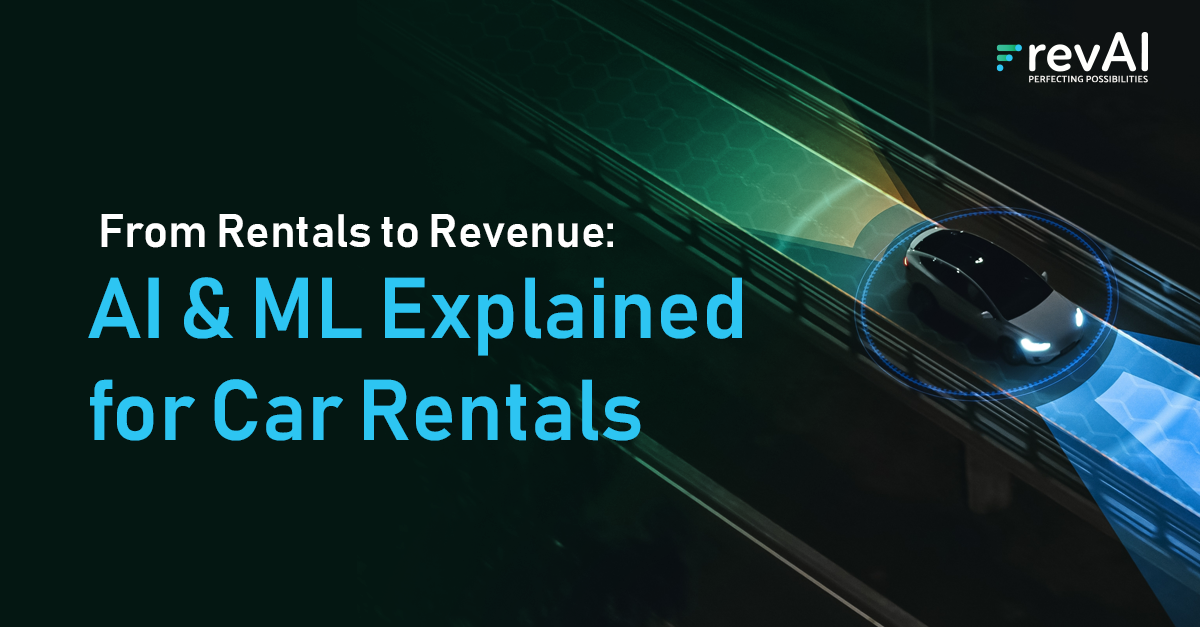23 Aug

From Rentals to Revenue: AI & ML Explained for Car Rentals
What is AI and Machine Learning in Car Rental?
Welcome to the exciting world of AI and Machine Learning in the car rental industry! If you’ve ever wondered how these two concepts could help you solve revenue challenges for your business, you’re in the right place.
1. Understanding AI & Machine Learning
Artificial Intelligence (AI) is a broad field of computer science that creates systems performing tasks that would normally require human intelligence. These tasks include problem-solving, understanding natural language, and making decisions.
Suggested Read: AI for Car Rental Revenue Management
Machine Learning (ML), a subset of AI, involves training computers to learn from data. They use patterns from data to make decisions, similar to how we learn from experiences.
2. The Intersection with Car Rental
AI and ML bring about a smarter car rental service with more margins to be earned. Imagine during a big city event, your car rental prices adjusting in real-time to match high demand. That’s the beauty of AI!
The Role of AI & ML in Resolving Car Rental Challenges
1. Dynamic Pricing Challenges
Car rental pricing is akin to a seesaw. It’s in perpetual motion, responding to multiple factors. Machine learning models enable dynamic pricing by analyzing various factors such as demand, supply, competitor pricing, time of booking, etc. This helps in maximizing revenue by setting the right price at the right time. Let’s dive into some of the challenges:
- Seasonal Variations: Summer might see a spike in rentals in vacation spots, while winter could be a peak time in ski-resort regions. Prices must adjust according to these seasonal swings.
Use Case: AI can recognize patterns from previous years to automatically adjust prices, ensuring maximum profitability.
- Local Events: Concerts, conventions, and sports events can drive up demand unexpectedly. The local calendar can be a gold mine of pricing opportunities if utilized effectively.
Use Case: By monitoring local event calendars, hotel and airline booking data and historical data, AI can predict spikes in demand and adjust prices accordingly.
- Time of the Day: Some urban areas might see higher demand during business hours, while tourist spots might have more rentals in the early mornings and evenings.
Use Case: Using AI, rental systems can monitor hourly booking patterns and dynamically set prices based on expected demand.
2. Forecasting Demand
Forecasting demand is a tricky game, one that’s filled with potential pitfalls. AI algorithms can predict demand based on factors like seasonality, weather, local events, and more. Accurate demand forecasting allows car rental companies to optimize fleet management, helping them decide how many cars to have at different locations and when. Key challenges are:
- Historical Data Inaccuracy: Past trends don’t always predict future demands. Reliance solely on historical data can sometimes mislead. Especially post-COVID when travel patterns have seen a reformation.
Use Case: Machine Learning can analyze historical data alongside current market trends, allowing for more accurate predictions.
- External Factors: Strikes, natural disasters, or global events can disrupt regular demand patterns.
Use Case: AI algorithms, when integrated with real-time demand indicators like the local and global news, can adjust predictions based on real-time global events.
3. Fleet Optimization
Having a fleet of cars is one thing; ensuring they’re in the right place at the right time is another ball game. By predicting demand and analyzing utilization patterns, AI can help in the optimal distribution of vehicles across different locations. This maximizes revenue by reducing idle inventory and more. Significant challenges may arise around:
- Idle Cars: Every car that sits unused represents lost revenue. Conversely, not having a car available during peak times can lead to missed opportunities.
Use Case: AI can suggest optimal car placements based on expected demand, ensuring fewer idle cars and more satisfied customers.
- Demand Hotspots: Certain locations may naturally have higher demand due to tourist attractions, business hubs, or transit points. These areas can command higher prices.
Use Case: AI algorithms can identify these hotspots in real-time and recommend fleet movements based on demand intensity.
- Peak Times: Rush hours, weekends, holidays, and event days see spikes in demand. Adjusting fleet distribution to cater to these times ensures maximum utilization and revenue.
Use Case: AI can analyze historical and real-time data to forecast peak times for specific locations, helping businesses strategically position their fleet.
- Supply-Demand Equilibrium: Maintaining this balance ensures consistent revenue and high customer satisfaction.
Use Case: AI can continuously monitor fleet utilization rates. When cars are idle, it might trigger lower prices to spur bookings. Conversely, during high demand with limited availability, it can recommend price surges.
- Purchase Decisions: Forecasting future demand can guide decisions regarding fleet expansion or reduction.
Use Case: Using AI, businesses can get insights into future demand trends, helping them make informed decisions about fleet purchases or retirements.
Key Advantages of AI & ML for Car Rentals in Revenue Management
For car rental businesses aiming to stay competitive, adopting AI and ML technologies is not just an option; it’s a necessity. Platforms that embrace these technologies provide a level of agility and responsiveness that traditional methods can’t match, ensuring a significant edge in a rapidly evolving market. Key advantages of AI/ ML for car rental revenue management are:
- Adaptive Pricing: AI analyzes real-time and historical data, enabling dynamic pricing adjustments to capture maximum revenue.
- Insightful Demand Forecasting: Through AI, businesses can predict rental demand more accurately, preparing for peak times and reducing idle fleet periods.
- Strategic Fleet Placement: AI guides the distribution of vehicles based on data patterns, ensuring cars are where customers need them most.
- Customer-Centric Operations: By aligning pricing and availability to demand, businesses elevate the customer experience.
- Data-Driven Advantage: AI’s data analysis capabilities provide a competitive edge, allowing businesses to make informed, proactive decisions.
How Can Rev-AI Help?
Navigating the intricacies of the car rental industry can be complex, especially when fine-tuning revenue streams. Yet, with the advent of AI and ML technologies, many of these complexities are seamlessly addressed. But what if one platform could solve most of your challenges?
Rev-AI is that platform. It helps set the right prices, accurately predicts when customers will want cars, and ensures cars are where they need to be. In short, it solves 80% of your revenue challenges, making business smoother and more profitable.
If you’re seeking a solution that can enhance profitability and give you peace of mind, consider Rev-AI as your trusted partner.
Discover more with a free demo: Request Demo here.



